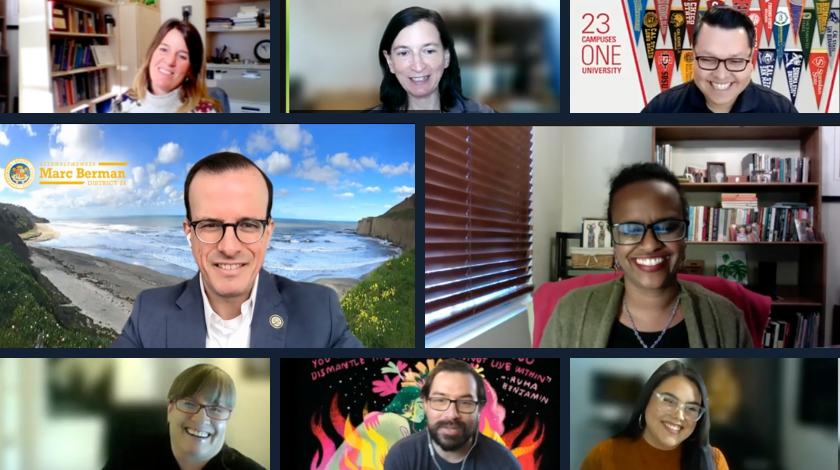On December 1, 2021, the Michelson 20MM Foundation in partnership with the Center for Equitable Higher Education (CEHE), hosted “Transforming Student Basic Needs Supports in California Higher Education”. The conversation focused on recommendations made by Dr. Rashida Crutchfield and Dr. Jen Maguire on how higher education leaders can effectively spend California’s recent multi-million dollar investment in student basic needs, which aims to make sure that challenges like housing and food insecurity cease to be impediments to student success. The state’s leading experts and the student basic needs community came together to ensure students are the center of this work, as well as this very important and timely discussion.
Student Basic Needs Are About Survival
Student Basic Needs champion, Assemblymember Marc Berman, kicked off the event by reminding us that the state’s recent investment was made possible because students and advocates raised their voices and shared their experiences via a series of hearings hosted by the Select Committee on the Master Plan for Higher Education, which the Assemblymember chairs. Student voices uplifted the urgency of this issue, which, according to Assemblymember Berman, is about survival: “Students are having to ask themselves, do I pay rent this month or do I buy textbooks for my classes? Should I take an extra shift at work to afford groceries, or should I attend class?” Assemblymember Berman went on to say, “If students are worried about where they’ll sleep at night or where their next meal will come from, how can they be expected to succeed academically, meet their educational goals and reap the benefit of a higher education?”.
Research-Based Recommendations
Dr. Rashida Crutchfield and Dr. Jen Maguire from the Center for Equitable Higher Education (CEHE) continued the conversation by sharing their recommendations for innovative approaches to tackling basic needs insecurity.
Drs. Crutchfield and Maguire urged institutions to avoid small-scale thinking, short-term thinking and recreating ineffective systems. They went on to urge system leaders to avoid loan requirements for students and race-neutral approaches that don’t center equity in practice. Furthermore, CEHE’s recommendations emphasize the need to cut out unnecessary red-tape in accessing basic needs resources, and warn against narrowing eligibility requirements that ground programs in all sympathy but no action.
Instead, research shows that institutions should:
- Expand and optimize campus resource hubs for a more coordinated approach;
- Develop and fund “housing navigators” and provide access to housing resources;
- Ensure recruitment reaches students most likely to benefit from support;
- Strengthen relationships with community-based partners and other colleges;
- Train faculty and staff in trauma-informed practices;
- Evaluate existing programs and interventions;
- Implement creative and de-stigmatizing awareness campaigns;
- Sustain Support for CalFresh.
While discussing the critical moment California higher education finds itself in, Dr. Crutchfield said, “Those of us who have been in this work for a long time have been piecing together our efforts with spit and duct-tape, frankly, combining all of our resourcefulness and available resources to gather this work, but this often prompted a mentality of scarcity. Now, we have this opportunity, with ongoing funds, to move with robust intention to be innovative, forward thinking, and sustainable”. Dr. Jen Maguire went on to say, “We need to make these research-informed recommendations to transformative institutionalized change because programs for students facing basic needs insecurity are essential”.
Key Takeaways From Our Expert Panel
In sharing their on the ground experience, our expert panel urged us to see students as humans first to create human centered approaches and programs. They reminded us that first come first served approaches perpetuate inequity, and that campuses must take the time to design comprehensive programs to reach our most vulnerable students. The experts implored campuses to coordinate poverty-informed and trauma-informed approaches and to look at the data that they have to identify and reach the most vulnerable students while not letting that data replace hearing directly from students. They urged campuses to build partnerships with community-based organizations that provide wrap-around support to students in order to maximize the impact of the state’s recent investment. Lastly, they emphasized that to be truly long-lasting, student basic needs work must become part of a campus’ DNA.
If you would like to learn more, a full recording of the event is on our YouTube Channel and additional resources shared during the conversation are also available here. The full event transcript is available here.
Michelson 20MM is a private, nonprofit foundation seeking to accelerate progress towards a more just world through grantmaking, operating programs, and impact investing. Co-chaired and funded by Alya and Gary Michelson, Michelson 20MM is part of the Michelson Philanthropies network of foundations.
To sign up for our newsletter, click here.
